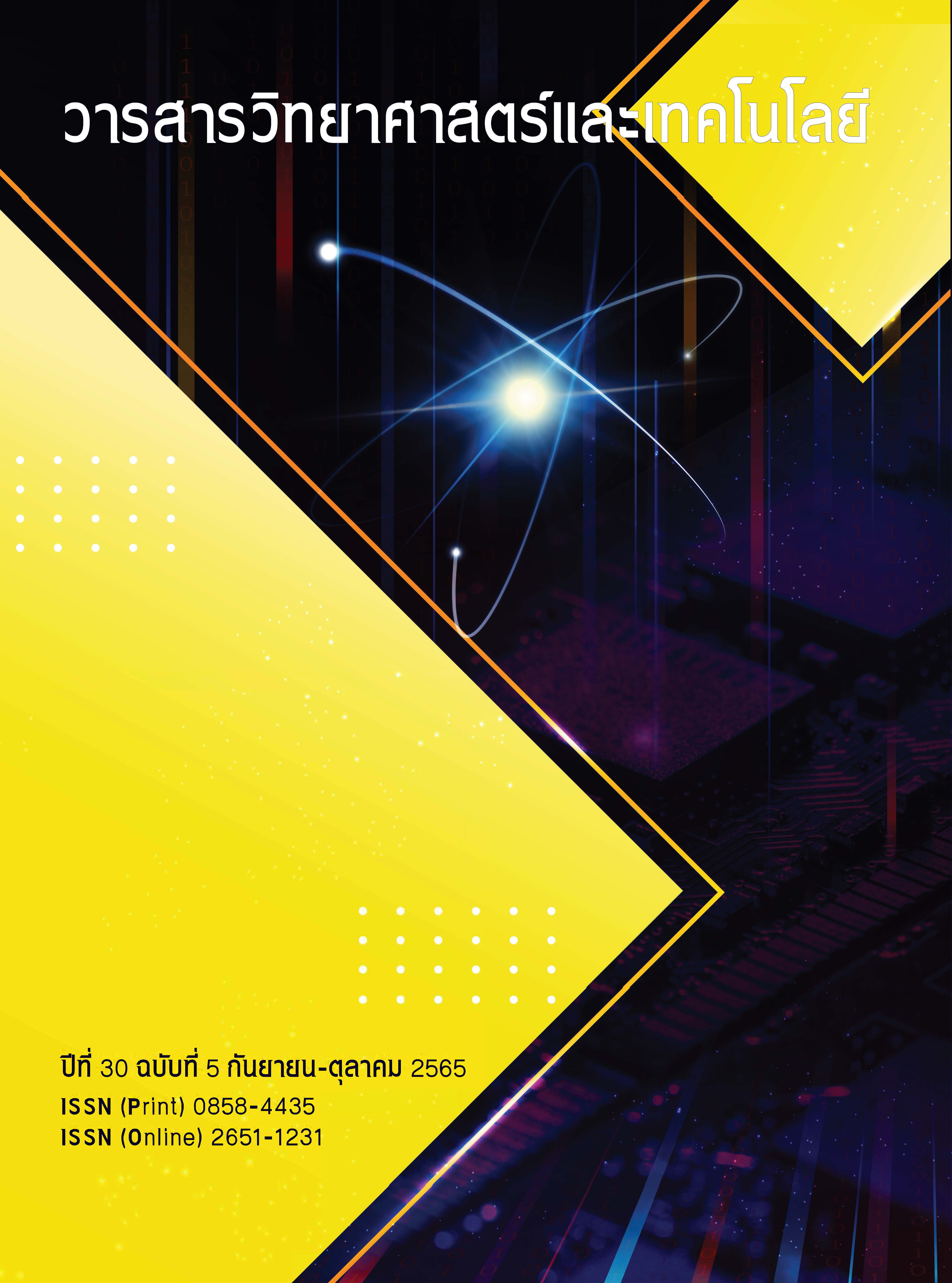Effects of Thermal, Acidic, and Enzymatic Extraction Methods on the Physicochemical, Microbiological, and Sensory Properties of Longkong Syrup
Main Article Content
Abstract
Longkong (Lansium domesticum Corr) is an important economic fruit in Southern Thailand. The prices of fresh longkongs in the harvesting season were significantly low due to large domestic production. This work attempted to give added value to low-grade longkong by producing syrup. The pectinase-treated longkong juice showed a higher recovery of soluble solids (p£0.05), compared to the other extraction methods (blending, hot water (90°C, 15 min), and hot acid (0.1N HCl at 90°C, 15 min)). Extracting a dilute sample (1 : 1 pulp to water ratio) improved the recovery of soluble solids (p£0.05). Longkong syrup was obtained by adding sucrose to longkong juices at a final concentration of 70% w/w. The color values (L*, a*, and b*) for non-enzymatic treated syrup were higher than that of the pectinase-treated syrup (p£0.05). Regarding clarity, the longkong syrup prepared with pectinase-treated juice showed significantly lower turbidity (p£0.05). Sensory evaluation showed that the pectinase-treated syrup had a higher mean score on all attributes (p£0.05) than the control sample (w/o pectinase). Levels of aerobic plate count, yeast and mold count, Staphylococcus aureus, and Salmonella spp. of the longkong syrups complied with Thai Community Product Standard (TCPS) 1500/2561 for plant-based syrup.
Article Details
References
Office of Agricultural, 2021, Annual report 2021 office of agricultural, Office of Agricultural, Ministry of Agriculture and Cooperatives, Bangkok, 168 p. (in Thai)
Sangkasanya, S. and Meenune, M., 2010, Physical, chemical and sensory quality of longkong (Aglaia dookkoo) as affected by storage at different atmospheres, As. J. Food Ag-Ind. 3: 64-74.
Thong-in, P., Intani, K., and Janpanya, N., 2020. Fruit grading (durian, mangosteen, rambutan longkong, longan and lychee), Eleven Star Intertrade Limited Partnership, Bangkok, 132 p. (in Thai)
Bureau of Nutrition, 2010, Nutritional value of fruit. Department of Health, Ministry of Public Health, Nonthaburi (in Thai)
Chuthong, T., Sompong, R., and Raungwatcharin, U., 2017, Development of dried longkong leather product supplemented with alginate-encapsulated Lactobacillus casei TISTR 146, Sci. Tech. Nakhon Sawan Raj. Uni. J. 9: 63-72 (in Thai)
Kaewruksa, C.K., and Lungmann, P., 2018, Product development of jelly from longkong falling grade. (Lansium domesticum, Corr.), BUSCIJ. 23: 767-778. (in Thai)
Juthong, T., Intarasirisawat, R., and Theppradit, R., 2021, Development of longkong syrup processing, Wichcha J NSTRU. 40: 46-60. (in Thai)
Thai Community Product Standard, 2018, Syrup TCPS number 1500/2561, Thai Industrial Standards Institute (TISI), Bangkok, 9 p. (in Thai)
Al-Hooti, S. N., Sidhu, J. S., Al-Saqer, J. M., and Othman, A., 2002, Chemical composition and quality of date syrup as affected by pectinase/cellulase enzyme treatment, Food Chem. 79: 215-220.
Sandri, I.G., Fontana, R. C., Barfknecht, D. M., and da Silveira, M. M., 2011, Clarification of fruit juices by fungal pectinases, LWT - Food Sci. Technol. 44: 2217-2222.
Aviara, N.A., Lawal, A.A., Nyam, D.S., and Bamisaye, J., 2013, Development and performance evaluation of a multi-fruit juice extractor, GJEDT. 2: 16-21.
Cendres, A., Chemat, F., Maingonnat, J.-F., and Renard, C.M.G.C., 2011, An innovative process for extraction of fruit juice using microwave heating, LWT - Food Sci. Technol. 44: 1035-1041.
de Oliveira, C.F., Giordani, D., Gurak, P.D., Cladera-Olivera, F., and Marczak, L.D.F., 2015, Extraction of pectin from passion fruit peel using moderate electric field and conventional heating extraction methods, Innov. Food Sci. Emerg. Technol. 29: 201-208.
AOAC. 2016. Official Methods of Analysis of AOAC International, 20th ed. Association of Analytical Communities, Gaithersburg, MD, USA.
Wainwright, H. and Hughes, P.A., 1989, Objective measurement of banana pulp colour, Int J Food Sci Technol. 24: 553-558.
Jalali, M., Jahed, E., Haddad Khodaparast, M. H., Limbo, S. and Mousavi Khaneghah, A., 2014, Evolution of bentonite and gelatin effects on clarification of variety of date fruit Kaluteh juice with response surface methodology, Int Food Res J., 21:1893-1899.
Department of Medical Sciences, 2018, Standard methods for food analysis, Ministry of public health, Nonthaburi. (in Thai)
Wanichkul, K, and Thong-in, P., 2008, Guideline of fruit grading in longkong (Aglaia dookkoo Griff.), Proceeding of 46th Kasetsart University Annual Conference : Plant, p. 279-286. (in Thai)
Pinelo, M., Zeuner, B., and Meyer, A.S., 2010, Juice clarification by protease and pectinase treatments indicates new roles of pectin and protein in cherry juice turbidity, Food Bioprod Process. 88: 259-265.
Krall, S., and McFeeters, R.F., 1998, Pectin Hydrolysis: Effect of Temperature, Degree of Methylation, pH, and Calcium on Hydrolysis Rates, J. Agric. Food Chem. 46:1311−1315.
Locatelli, G.O., Finkler, L., and Finkler, C.L.L., 2019, Comparison of acid and enzymatic hydrolysis of pectin, as inexpensive source to cell growth of cupriavidus necator, Anais da Academia Brasileira de Ciências. 91: e20180333
Joshi, V. K., Chauham, S. K., and Lal, B. B., 1991ม. Extraction of juices from peaches, plums and apricots by pectinolytic treatment, J. Food Sci. Technol. 28:64–65.
El-Sharmouby, G.A., Aleid, S.M., and Al-Otaibi, M. M., 2014, Liquid sugar extraction from date palm (Phoenix dactylifera L.) fruits, J. Food Process Technol. 5: 12.
El-Nagga, E.A. and El–Tawab, Y.A.A., 2012, Compositional characteristics of date syrup extracted by different methods in some fermented dairy products, Ann. Agric. Sci. 57: 29-36.
Sandri, I. G., Fontana, R. C., Barfknecht, D. M., and da Silveira, M. M., 2011, Clarification of fruit juices by fungal pectinases, LWT - Food Sci. Technol. 44: 2217-2222.
Sri Lanka Standard Institute, 2010, Fruit cordial concentrates, fruit squash concentrates and fruit syrup concentrates. SLS. 730: 2010.
Klasson, K.T., Sturm, M.P., and Cole, M.R., 2022, Acid hydrolysis of sucrose in sweet sorghum syrup followed by succinic acid production using a genetically engineered Escherichia coli, Biocatal. Agric. Biotechnol. 102231
Ali, H., Saad, R., and El-Haj, B., 2015, Prevention of cap-locking of syrup product by treating the manufacturing process with citric acid monohydrate, Int. J. Pharm. Chem. 5: 218-226.
Venkatachalam, K., and Meenune, M., 2012, Changes in physiochemical quality and browning related enzyme activity of longkong fruit during four different weeks of on-tree maturation, Food Chem. 131:1437-1442
Einhorn-Stoll, U., 2018, Pectin-water interactions in foods - from powder to gel, Food Hydrocoll. 78: 109-119.


